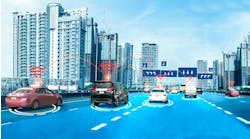July 1, 2016—The National Highway Traffic Safety Administration (NHTSA) announced Wednesday that it was opening a preliminary investigation into the first known fatal crash involving Tesla Motors’ Autopilot automated driving system.
Tesla released a statement on the accident saying it was cooperating with NHTSA’s preliminary investigation. The statement also gave statistics showing how rare an incident like this is with the Autopilot system activated and reminded that a driver’s attention should remain focused on driving even with the system active.
According to Tesla’s data, it was the first known fatality in just more than 130 million miles where autopilot was activated. The average fatality in the U.S. among all vehicles occurs every 93 million miles, while the worldwide average is 60 million miles.
The accident occurred when the vehicle was on a divided highway with Autopilot engaged when a tractor trailer drove across the highway perpendicular to the Tesla Model S. The driver nor the Autopilot system noticed the white tractor trailer against the brightly lit sky. The high ride height of the tractor trailer along with its position on the road caused the Model S to pass under the trailer on impact. Tesla said under different circumstances the system would have likely detected the obstacle and would have been able to prevent serious injury.
Tesla's shares briefly slipped about 2 percent after news of the fatal crash and NHTSA investigation came out. As of writing, shares have come back up and are at a net loss of $1.
A recent survey showed that almost three-quarters of U.S. drivers would trust an autonomous vehicle to take over their daily commute despite other surveys finding the opposite, according to a report from Bloomberg.
The survey from AlixPartners showed 73 percent of the 1,517 people surveyed would be willing to let an autonomous car take over all their driving needs, while 90 percent said they would let an autonomous car handle their daily commute if they could occasionally take the wheel.
Another survey from the University of Michigan Transportation Research Institute last month found that more than half of drivers weren’t ready to give up driving. Forty-six percent said they wanted nothing to do with autonomous cars and 39 percent said they would feel comfortable with partially autonomous features.
AlixPartners said that by 2020, partially- or fully-autonomous cars will be widespread on the road. Features such as lane-keep assist and stop-and-go traffic navigation will be commonplace.




